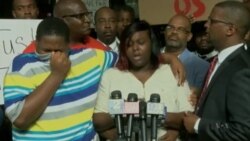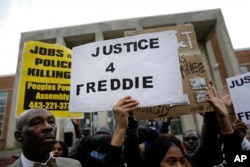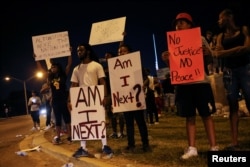Police shooting deaths of two black men, one in Louisiana July 3 and the other in Minnesota on July 4, sparked protests against police throughout the U.S. During a protest in Dallas the evening of July 7, five white police officers were shot and killed in an ambush style attack by a lone gunman.
The protesters contend that black men in particular are at risk of losing their lives in confrontations with law enforcement officers. According to at least one study, the protesters have a point. Nancy Krieger, a professor of social epidemiology at the Harvard T.H. Chan School of Public Health, led the study. The researchers are calling for police-related shooting deaths to be counted and treated as a public health issue.
"No one wants to see people being killed, people being killed by the police or police being killed in their jobs," Krieger told VOA in a Skype interview.
She pointed out that while deaths of police officers are documented, there's little data on the number of people killed by police officers. The Washington Post newspaper began tracking those fatally shot by police in 2015. The newspaper placed the 2016 count at 515 deaths as of July 11. The Guardian, a British newspaper, keeps track of all deaths caused by law enforcement officials in the U.S. The Guardian put the total at 574 for the same date.
Krieger led a team of researchers in producing a report, "Police Killings and Police Deaths Are Public Health Data and Can Be Counted," which was published last December 2015, in PLOS Med, a peer-reviewed on-line publication. Krieger said the fact that there are deaths makes it a public health issue as well as a criminal justice issue.
Impact on health
She maintains that police shootings and riots following police-caused deaths have "major repercussions for public health in terms of mortality, in terms of trauma, in terms of the impact on the families and the communities involved."
Last year, riots in Baltimore were sparked by the death of Freddie Gray, a man who died while being transported in a police van. During the riots, people who needed insulin couldn't get it, and opiod drugs robbed from a pharmacy were sold on the street.
The death of Alton Sterling in Baton Rouge, Louisiana on July 3 was recorded on a witness' cell phone in a video that went viral on the Internet. Quinyetta McMillan, Sterling's partner, later spoke out at a news conference. "As a mother, I have to raise a son that has to remember what happened to his father, "she said. "He had to watch this as it was played out of the outlets." Her son was overcome with grief while McMillan addressed the crowd.
Krieger said the researchers compared deaths of both black and white men that were caused by police over the past 50 years in several U.S. cities, using historic data provided by U.S. agencies and more recent numbers from The Guardian newspaper, which relies on local news reports of police shooting deaths. While researchers say the data call for more detailed analysis, the statistics indicate that the racial disparities in killings are enormous. "Black men, compared to white men, were from five to 19 times at greater risk of a death that was classified as a law enforcement-related death." Krieger added, "When there's that much variation, it tells you that there are other factors are helping to cause that variation."
Better data
Krieger says improving on that data, and gaining a better understanding of the problem, is possible if public health agencies are empowered to create a uniform system to compile law enforcement deaths as a reportable health condition, similar to the way researchers track death from diseases.
She said the U.S. government already has the mechanisms in place to record the causes of all deaths and that this data is released weekly. She said it would be easy to add the deaths caused by law enforcement officials. It would be the first step towards preventing more deaths.
"We are starting with the basic principle that first you need to know what the patterns are....what the burden of the mortality is, and then you start doing the kinds of research to try to understand why."
Last December, after releasing her report, Krieger told a public radio station in Wisconsin that if the data were collected, public health officials could find a way to reduce or prevent police-caused fatalities. "That's the essence of public health: to acquire data in order to prevent conditions that can be prevented, and to improve population health and to promote health equity," she said.
Currently, no government health agency does this, and none is funded to analyze the causes of shooting deaths.














